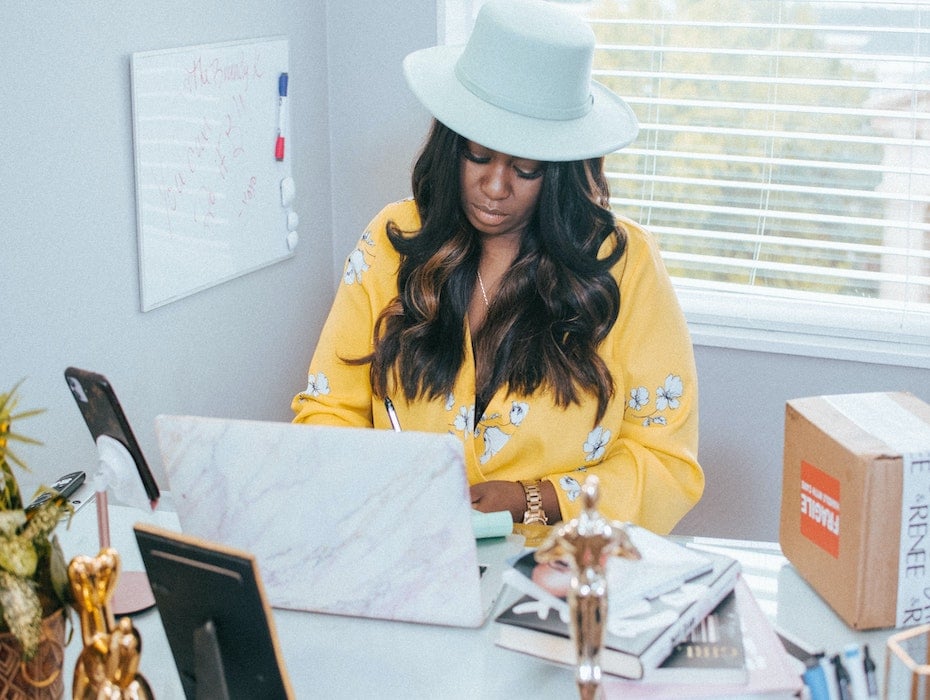This blog is part of the series “The power of the female athlete.” View the complete series at the links at the end of this article.
In recent years, topics including maternity leave, dress codes, mental health, harassment, and diversity have taken the spotlight. This is, in large part, thanks to women who, after facing adversity themselves, decided to be a driving force for change.
Glaring gender inequities exist across every industry, from sports and business to relationships. To create lasting systemic change, we need people who speak up, push back, and use their influence to open opportunities for marginalized communities; these powerhouse women in business and athletics are doing just that.
Female athlete:
Naomi Osaka urges sports to prioritize athletes’ mental health
In May, Naomi Osaka, one of the world’s top tennis players, was fined $15,000 for refusing to join a press conference. Her goal had been to protect her mental health, but she unwittingly started a broader conversation about mental health in the sports industry. While Osaka didn’t set out to become a mental health advocate, she realized she could use her influence to make an impact.

“The intention was never to inspire revolt,” she wrote in her recent essay for TIME. “But rather to look critically at our workplace and ask if we can do better.”
Osaka, who plays for Japan and received the high honor of lighting the Olympic cauldron at the Opening Ceremonies Friday night and her Olympic game has been strong.
According to TIME, off the court, her decision to step away from tennis between the French Open and the Olympics proved controversial and opened a broader discussion on the importance of maintaining mental health, both inside and outside of sports. “It’s O.K. to not be O.K.,” Osaka wrote in a recent cover essay for TIME. “Michael Phelps told me that by speaking up I may have saved a life. If that’s true, then it was all worth it.”
Studies have shown that athletes are already at a greater risk for mental health issues such as depression and anxiety. Osaka has called on the French Open and other sports organizations to enact measures that allow athletes to protect their mental health and set boundaries when necessary without facing penalties.
Female in business:
Whitney Wolfe Herd creates a safer online dating experience for women
Whitney Wolfe Herd was once the vice president of marketing at Tinder, but in 2014, she left her position and later filed a lawsuit against the dating app for sexual harassment. Instead of leaving the world of dating apps forever, she decided to create a new app that would put control back into the hands of women: Bumble.
Despite being one of the newer online dating apps (Bumble was founded after other major dating apps such as OkCupid, Zoosk, and Hinge) Bumble is second only to Tinder in number of US users. Earlier this year, the company went public and closed with a market cap of over $7 billion.

The dating app uses artificial intelligence to scan for violations such as harassment and hate speech. Those violations are sent to a team of 2,000 human moderators. They are swift to penalize or ban the users responsible, which helps make the app a safer place.
Herd is advocating for safer digital spaces beyond the dating app scene, too: she supported new legislation in Texas that made sending lewd photographs without consent a crime. This put Texas on the small but growing list of states that are introducing legislation to penalize not just revenge pornography, but unsolicited explicit photos. In a world where technology has put women in particular at an even greater risk of harassment, Herd’s actions are a significant step in the right direction.
Female consultants: Mandy Price and Star Carter help businesses create systemic change
Mandy Price and Star Carter are no strangers to discrimination in the workplace. Price was once labeled a firm’s “diverse partner.” Meanwhile, Carter took maternity leave twice, and despite maternity leave being part of her benefits, she was told her promotion to partner would be delayed by a year as a result.
Price and Carter decided to take these experiences and create Kanarys, a data-driven platform for tracking diversity, equity, and inclusion metrics at companies.
By giving companies a transparent look at their DEI data, providing coaching sessions, and building frameworks to help companies implement DEI recommendations, Price and Carter are helping companies create more diverse and inclusive teams. But they’re not stopping there.
“People are starting to say, ‘Hey, if we can’t retain women and people of color, there’s something within our organization that needs to change,’” says Price.
Kanarys does more than help create diverse teams. The company also provides the resources to create safe, equitable spaces to retain those teams, encouraging long-term, systemic change, not just improved vanity metrics.
Female board member: Cassie Nielsen gives women more seats at the table
In 2018, only 5.3% of board chair positions were held by women, despite the fact that women make 70–80% of household purchasing decisions.
Cassie Nielsen, the talent partner at VMG Partners, decided we couldn’t wait around for things to change on their own, so she created 50/50 Women on Boards with the goal of creating gender balance and diversity on corporate boards.

The group hosts workshops and educational events and programs and conducts research to keep a finger on the pulse of gender diversity in business. The nonprofit also works with companies to place women on their boards. According to their research, women now hold 24.4% of board seats, thanks in part to WOB’s efforts.
Female sports team: Norwegian beach handball team challenges outdated traditions
In July, the European Handball Association’s Disciplinary Commission fined the Norwegian women’s beach handball team $1,700 for wearing “improper clothing.” The clothing in question: tank tops and shorts similar to what the men’s team wears.
Beach handball is a relatively new sport, but women’s sports teams are no stranger to sexist dress code. It wasn’t until the 2012 London Olympics that the rules changed for beach volleyball, allowing the women’s teams to wear shorts.
Norway has been petitioning for shorts to be considered proper attire for over a decade, to no avail, so the women’s team decided to take action. As a result, there was an outcry on Twitter calling attention to the outdated and sexist regulations.
“People cheered on us for going in front of several teams and taking the brunt,” says player Katinka Haltvik. “Not all teams can afford to pay such fines.”
The team was more than willing to pay the fine and take the backlash for the sake of other sports teams. And that willingness to put themselves in the line of fire may be the very catalyst needed to drive change in sports.
Women are a driving force behind change
The World Economic Forum estimates true gender equity won’t be achieved for nearly 100 years. An increase in women board members and improved protections for female athletes are only the beginning of a long journey to more equitable treatment in the office and on the field.
These women are working to speed up that timeline. By speaking out about inequities and pushing back against outdated regulations or a history of poor practices, they are setting the stage for a generation of women who will be able to work or compete in an environment that is inclusive, diverse, and safe.
Read more from The power of the female athlete:
When 42% isn’t enough: Gender equality matters in both business and sports
5 examples of powerhouse women pushing back in business and athletics
Updated Mar 13, 2025













